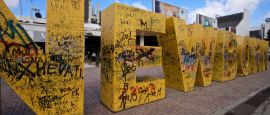Pristina History
Long, complicated and (depending on who you question) still not fully resolved, the history of Pristina will always bring up more issues than answers.
Archaeologists argue that after the Neolithic era, the Romans were among the first to settle in the vicinity of Pristina. The ruins of the ancient city of Ulpiana were found less than 20km (12.5 miles) to the south.
An earthquake in AD518 razed almost the entire city, but it was rebuilt by Byzantine Emperor Justinian I who renamed it Iustiniana Secunda.
By the 13th century, it was the capital city of the Kingdom of Serbia, held in high regard thanks to its position on the trade route between Adriatic Sea ports.
In 1389, the Battle of Kosovo, which took place just to the northwest of Pristina, saw the Ottoman Turks defeat the Serbian Army. Due to heavy losses on both sides, plus the death of a Turkish sultan, many argued at the time that the battle was actually a stalemate.
Still, Serbians fled the city and over the centuries were replaced by an emerging population of Albanians.
In August 1912, Albanian rebels overthrew the Ottomans in Pristina, before Serbian forces took the city in September. The Bulgarians then seized power in 1915, prior to Pristina becoming part of the First Yugoslavia in 1918.
After WWII, when the Nazis had taken control of the city and sent much of the Jewish population to be executed in Germany, Pristina’s population fell to as little as 9,500.
The city was shelled in 1999 following the outbreak of the Kosovo War. Many of the Pristina Albanians who weren’t forcibly expelled from the city, fled instead.
Pristina became the capital city of Kosovo upon its declaration of independence on 17 February 2008, but relations between Serbia and Kosovo remain volatile.
Did you know?
• The 14th-century Gračanica Monastery, just outside Pristina, is a UNESCO World Heritage site.
• The Pristevka River was built over in the 1950s and now flows through underground tunnels.
• Pristina had a huge number of Ottoman-era homes, but only a handful remain after most were destroyed in the 1950s.
Do you have any Feedback about this page?
© Columbus Travel Media Ltd. All rights reserved. No part of this site may be reproduced without our written permission, click here for information on Columbus Content Solutions.
¿Tiene comentarios sobre esta página?
© Columbus Travel Media Ltd. All rights reserved. Ninguno de los contenidos de esta Web debe ser reproducido sin nuestra autorización expresa y escrita. Para más información sobre como obtener permiso para la utilización del contenido clica aquí. No part of this site may be reproduced without our written permission, click here for information on Columbus Content Solutions .
Avez-vous des commentairessur cette page?
© Columbus Travel Media Ltd. All rights reserved. Le contenu de ce site ne peut être reproduit sans autorisation écrite. Cliquez ici pour plus d'information sur notre 'des solutions de contenu’. No part of this site may be reproduced without our written permission, click here for information on Columbus Content Solutions.
Haben Sie Feedback zu dieser Seite?
© Columbus Travel Media Ltd. All rights reserved. Alle Inhalte dieser Seite sind urheberrechtlich geschützt und dürfen nur mit schriftlicher Genehmigung des Verlags genutzt werden. Weitere Informationen finden Sie in unseren Lizenzbestimmungen. No part of this site may be reproduced without our written permission, click here for information on Columbus Content Solutions .





 You know where
You know where